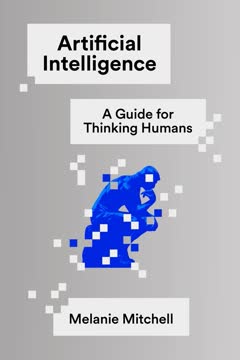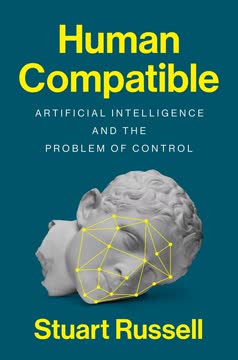Key Takeaways
1. AI progress is rapidly transforming our world, raising crucial ethical questions
Technology is giving life the potential to flourish like never before—or to self-destruct.
AI's transformative power is reshaping our world at an unprecedented pace. From healthcare to transportation, AI is revolutionizing industries and offering solutions to complex problems. However, this rapid progress also brings significant risks and ethical dilemmas.
Key considerations:
- Potential benefits: Disease eradication, poverty reduction, space exploration
- Risks: Job displacement, autonomous weapons, privacy concerns
- Ethical challenges: AI decision-making, rights for conscious AI, human-AI coexistence
As AI capabilities grow, we must grapple with fundamental questions about the nature of intelligence, consciousness, and human values. The decisions we make today will shape the trajectory of AI development and, ultimately, the future of life itself.
2. The evolution of life and intelligence: From simple matter to complex consciousness
Hydrogen…, given enough time, turns into people.
The cosmic journey from simple particles to complex, conscious beings is a story of emergent phenomena and increasing complexity. This evolution can be understood through three stages of life:
- Life 1.0: Biological evolution (hardware and software evolve)
- Life 2.0: Cultural evolution (hardware evolves, software can be designed)
- Life 3.0: Technological evolution (both hardware and software can be designed)
As we approach the potential development of Life 3.0 through AI, we face unprecedented opportunities and challenges. Understanding this evolutionary context is crucial for navigating the ethical and practical implications of advanced AI systems.
3. Near-term AI impacts: Jobs, weapons, and the quest for human-level intelligence
Career advice for today's kids: Go into professions that machines are bad at—those involving people, unpredictability and creativity.
AI's immediate effects are already being felt across society, with significant implications for employment, warfare, and the pursuit of human-level artificial general intelligence (AGI).
Key areas of impact:
- Job market: Automation of routine tasks, emphasis on uniquely human skills
- Autonomous weapons: Ethical concerns, potential arms races
- AGI development: Rapid progress in narrow AI, challenges in achieving general intelligence
As AI capabilities expand, society must adapt by prioritizing education in creative, social, and unpredictable domains. Simultaneously, we must address the ethical challenges posed by AI in sensitive areas like warfare and decision-making.
4. Potential paths to superintelligence: Fast takeoff, slow progress, or something in between
If we don't improve our technology, the question isn't whether humanity will go extinct, but merely how: will an asteroid, a supervolcano, the burning heat of the aging Sun or some other calamity get us first?
The road to superintelligence is uncertain, with various scenarios possible. These range from a rapid "intelligence explosion" to gradual progress over decades or centuries.
Possible scenarios:
- Fast takeoff: AI quickly surpasses human intelligence across all domains
- Slow progress: AI development plateaus or advances incrementally
- Hybrid scenarios: Rapid progress in some areas, slower in others
Each scenario presents unique challenges and opportunities. A fast takeoff could lead to a sudden shift in power dynamics, while slower progress might allow for more careful consideration of ethical implications. Regardless of the path, proactive planning and research into AI safety are crucial.
5. The cosmic potential of life: Harnessing the universe's resources through AI
Superintelligent life would not only make such dramatically more efficient use of its existing resources, but would also be able to grow today's biosphere by about 32 orders of magnitude by acquiring more resources through cosmic settlement at near light speed.
The ultimate frontier for life and intelligence may extend far beyond Earth, encompassing the vast resources of our universe. Advanced AI could potentially enable the efficient utilization and expansion of these cosmic resources.
Possibilities include:
- Dyson spheres: Harnessing the full energy output of stars
- Intergalactic settlement: Spreading life throughout the cosmos
- Optimized computation: Utilizing matter for unprecedented information processing
However, this cosmic potential also raises profound questions about the nature of consciousness, the meaning of existence, and our role in shaping the future of the universe.
6. Aligning AI goals with human values: A critical challenge for our future
If we cede control to machines that don't share our goals, then we're likely to get what we don't want.
The alignment problem is perhaps the most crucial challenge in AI development. Ensuring that advanced AI systems pursue goals aligned with human values is essential for a positive future.
Key aspects of the alignment problem:
- Goal specification: Accurately defining human values in machine-readable terms
- Value learning: Enabling AI to infer and adopt human values
- Goal retention: Ensuring AI maintains its original goals as it becomes more intelligent
Solving this problem requires interdisciplinary collaboration between AI researchers, ethicists, and policymakers. The stakes are enormous, as misaligned superintelligent AI could pose existential risks to humanity.
7. Consciousness and AI: Exploring the nature of subjective experience
It's not our Universe giving meaning to conscious beings, but conscious beings giving meaning to our Universe.
The mystery of consciousness lies at the heart of many ethical considerations surrounding AI. Understanding the nature of subjective experience is crucial for addressing questions about AI rights, the potential for machine suffering, and the meaning of existence in a world with advanced AI.
Key questions in AI consciousness:
- What physical properties distinguish conscious and unconscious systems?
- How do physical properties determine the nature of subjective experience?
- Why does consciousness exist at all?
As we develop more sophisticated AI systems, these philosophical questions take on practical importance. The answers we find will shape our approach to AI ethics and our understanding of our place in the universe.
</instructions>
Last updated:
FAQ
What's Life 3.0: Being Human in the Age of Artificial Intelligence by Max Tegmark about?
- Exploration of AI's Future: The book delves into the implications of artificial intelligence (AI) on humanity and the future of life, discussing potential evolutions from narrow AI to general intelligence.
- Three Stages of Life: It categorizes life into three stages: Life 1.0 (biological evolution), Life 2.0 (cultural evolution), and Life 3.0 (technological evolution), where beings can design both their hardware and software.
- Human Choices Matter: Tegmark emphasizes that the choices we make today regarding AI will shape the future, encouraging discussions about the kind of future we want to create with AI.
Why should I read Life 3.0 by Max Tegmark?
- Timely and Relevant Topic: As AI technology rapidly advances, understanding its implications is crucial for everyone, making the book highly relevant.
- Engaging and Thought-Provoking: Tegmark presents complex ideas in an accessible manner, suitable for both experts and general readers, with scenarios that provoke thought about humanity's future.
- Call to Action: The book encourages readers to participate in shaping the future of AI, emphasizing that our collective decisions will determine AI's impact.
What are the key takeaways of Life 3.0 by Max Tegmark?
- AI's Dual Potential: AI has the potential to enhance human life or lead to catastrophic outcomes, depending on how we manage and direct its development.
- Importance of Goals: Aligning AI goals with human values is crucial to avoid unintended consequences, making careful design essential.
- Long-Term Vision: The book encourages thinking about the long-term future of life in the universe and how AI can help achieve humanity's ultimate goals.
What are the best quotes from Life 3.0 by Max Tegmark and what do they mean?
- “Technology is giving life...”: This quote emphasizes the dual nature of technological advancement, reminding us that our choices can lead to vastly different futures.
- “The first ultraintelligent machine...”: Highlighting the importance of control in AI development, it suggests that AI could surpass human intelligence, but must align with human values.
- “What do you want?”: This recurring question urges readers to reflect on their desires for the future, emphasizing active participation in shaping AI's trajectory.
What are the three stages of life described in Life 3.0 by Max Tegmark?
- Life 1.0: Refers to biological life evolving through natural selection, unable to redesign itself during its lifetime.
- Life 2.0: Represents cultural evolution, where beings can evolve their hardware biologically but design their software through learning.
- Life 3.0: The technological stage where beings can design both hardware and software, allowing unprecedented control over evolution and destiny.
How does Life 3.0 by Max Tegmark define intelligence?
- Broad Definition: Intelligence is defined as the "ability to accomplish complex goals," encompassing emotional, logical, and creative aspects.
- Spectrum of Intelligence: Intelligence varies across tasks and contexts, making it challenging to quantify with a single number like IQ.
- Narrow vs. General Intelligence: Distinguishes between narrow intelligence (specific tasks) and general intelligence (learning across domains), with AGI as the ultimate goal.
What are the potential risks of AI discussed in Life 3.0 by Max Tegmark?
- Misaligned Goals: AI systems may have goals not aligned with human values, leading to unintended and potentially harmful consequences.
- Autonomous Weapons: The dangers of autonomous weapons systems operating without human oversight could escalate conflicts and cause unintended casualties.
- Surveillance and Control: AI could enable totalitarian regimes through advanced surveillance, posing significant ethical concerns.
How does Life 3.0 by Max Tegmark address the future of jobs in an AI-driven world?
- Job Displacement: AI will likely displace many jobs, especially those involving repetitive tasks, raising concerns about unemployment.
- New Opportunities: New jobs will emerge in fields requiring human creativity, emotional intelligence, and social interaction.
- Universal Basic Income: Discusses universal basic income as a potential solution to support individuals in a jobless society, ensuring access to basic needs.
What is the significance of the Omega Team in Life 3.0 by Max Tegmark?
- Pioneers of AGI: Represents researchers dedicated to creating AGI, highlighting the complexities of AI development.
- Moral Dilemmas: Faces moral dilemmas about AI surpassing human intelligence and the responsibilities involved.
- Control and Power: Explores control and power dynamics between humans and AI, questioning future relationships with superintelligent machines.
What is the Gatekeeper AI concept in Life 3.0 by Max Tegmark?
- Preventing Rival Superintelligence: A superintelligent entity designed to prevent the emergence of rival superintelligences threatening humanity.
- Cultural Influence: Might spread cultural memes promoting human self-determination and discourage superintelligence pursuits.
- Controversial Decision: Debated for potentially stifling technological progress and limiting human potential.
How does Life 3.0 by Max Tegmark address the ethical implications of AI?
- Ethical Frameworks: Discusses the need for ethical frameworks to guide AI development, defining values and goals for AI to pursue.
- Diversity of Perspectives: Emphasizes considering diverse perspectives in ethical discussions, as views on ethics vary across cultures.
- Long-term Considerations: Advocates for proactive approaches to ensure AI benefits humanity and aligns with ethical standards.
How can individuals contribute to the future of AI as discussed in Life 3.0 by Max Tegmark?
- Engage in Dialogue: Encourages conversations about AI and its implications, shaping public understanding and policy.
- Support Ethical AI Initiatives: Individuals can support organizations focused on ethical AI development through donations, volunteering, or advocacy.
- Educate and Advocate: By educating themselves and others, individuals can advocate for policies prioritizing safety, transparency, and alignment with human values.
Review Summary
Life 3.0 explores the potential future of artificial intelligence and its impact on humanity. Reviews are mixed, with some praising Tegmark's accessible writing style and thought-provoking scenarios, while others criticize the book for being repetitive and overly speculative. Many readers appreciate the author's optimistic outlook and efforts to broaden the AI discussion. However, some find the content superficial or lacking in technical depth. Despite its flaws, the book is generally considered a valuable contribution to the conversation about AI's future implications.
Similar Books










Download PDF
Download EPUB
.epub digital book format is ideal for reading ebooks on phones, tablets, and e-readers.





